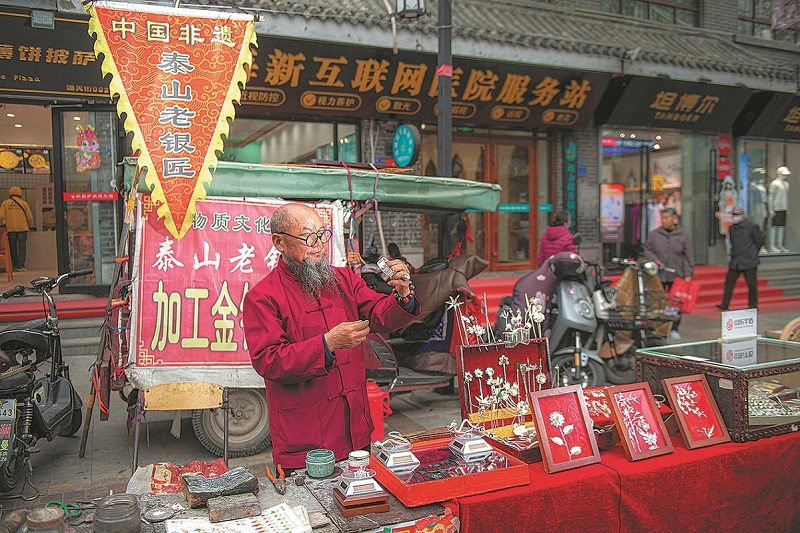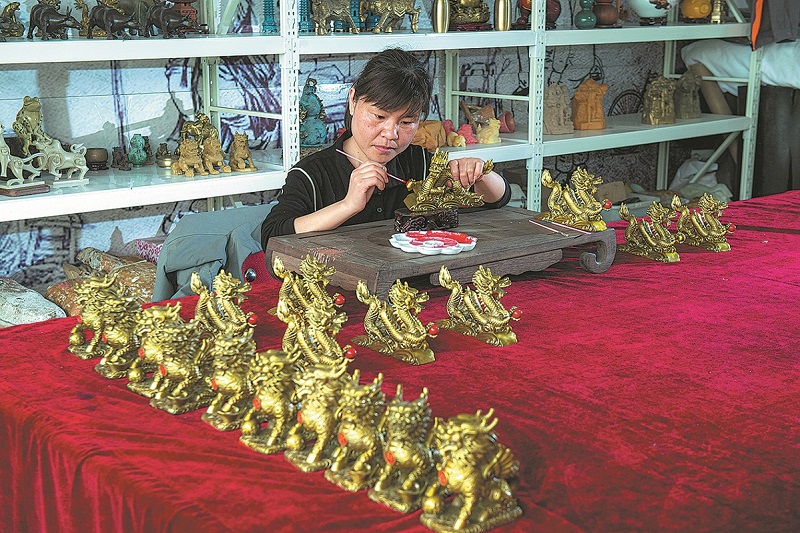NPC inspection tour finds traditions strengthened, but legal revisions may be needed

Inheritor Zhang Keqing demonstrates his silver ornament works in Tai'an in April. LIU SHUI/XIE JIUJIANG/FOR CHINA DAILY
Effective inheritance
Carrying tools and colorful dough, Li, the inheritor of dough sculpture, usually shuttles between campuses in Heze, to teach students kneading, rolling, pinching and sculpting skills.
He shapes the dough into blooming flowers, historical figures and cartoon characters, captivating the children and sparking their eagerness to learn.
"The sculpting experience is a big joy for young people, and the process also plants the seeds of traditional cultures in their hearts," said Li, who likes to be innovative and imaginative with his dough sculptures.
"Innovation is more conducive to attracting youngsters, so that our living heritage can be effectively passed on," he explained.
The Heze intangible cultural heritage exhibition hall is one of venues where Li teaches. In the building, which is located in a science and technology park, students can learn over 10 traditional skills.
"We provide special workshops for inheritors like Li to display their works and skills in the park. We also invite them to educate students on their talents through courses and lectures," said An Yuan, an executive director of the park's committee.
In her view, the key to protecting and developing intangible cultural heritage is inheritance, and the root of this inheritance is people.
"Allowing inheritors to enter the park to teach and share the value of living heritage items is the foundation of inheritance. Without their storytelling, the traditional cultures and skills may not be passed on," she said. "At the same time, for students it's important to deeply understand the value behind the skills or crafts. Only by developing and innovating on this basis can intangible cultural heritage items truly be continued," she added.
Liu, the NPC deputy, also stressed the importance and urgency of passing on living heritage items during the recent law enforcement inspection tour.
She called for government departments to take more effective measures to enhance talent cultivation.
"We have living heritage items that focus on craftsmanship and can bring economic benefits through industrialization, such as clay sculpture and straw-weaving. We also have traditional operas and martial arts that may not be industrialized and yield immediate results," she said.
"This means that we must provide different approaches or pathways to educate talent and strengthen the heritage protection, so as to ensure the effectiveness of inheritance," she added, suggesting the top legislature specify relevant provisions as soon as possible.

An inheritor works at the Nie family bronze casting workshop in Feicheng, Shandong province, in April. LIU SHUI/XIE JIUJIANG/FOR CHINA DAILY
- Top legislature schedules standing committee session for late February
- China's top legislator meets with Uruguayan president
- Senior legislator surveys Anhui on formulating outline of provincial 15th Five-Year Plan
- China's top legislator meets with British PM
- NPC deputies see more engagement with top court



